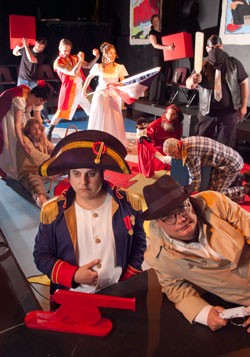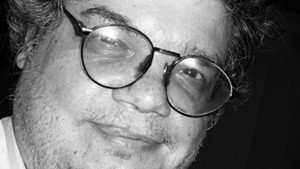
- Matthew Thorsen
- Cast of The Napoleon
Pop culture hasn’t been too kind to French Emperor Napoleon Bonaparte. For every work acknowledging his monumental role in world history, such as Tolstoy’s novel War and Peace, there are dozens of cartoonish riffs on his short stature — a widely held image of the man that some Bonaparte scholars say is probably inaccurate. (Apologies to director Friz Freleng, Bugs Bunny and the rest of the cast and crew of the 1956 animated short “Napoleon Bunny-Part.”)
The Green Candle Theatre Company production of The Napoleon 2012, an original play currently running at Burlington’s Off Center for the Dramatic Arts, pays tribute to the Little Corporal in an utterly new way. Here, Bonaparte (Alex Dostie) is as comically imperious as we’ve seen him since Terry Gilliam’s 1981 film Time Bandits (in which Ian Holm plays a menacing Napoleon who giggles disarmingly at the sight of little people hitting and pushing each other onstage). At other moments, though, Dostie’s Bonaparte is gloomy to the point of being haunted — bearing the weight of the world on his shoulders while pining for his soul mate, Josephine (Tracey Girdich).
The play manages to reconcile such disparate depictions of Bonaparte by dramatizing him in two parallel stories. One is the received history of Napoleon’s rise and fall as the emperor of France in the late 18th and early 19th centuries. The other is the story of a passionate but anarchic theater company scrambling to mount its play about Napoleon’s rise and fall.
To complicate the picture further, neither of these stories aim at anything resembling a conventional evocation of Napoleon — or of war, peace, history or theater, for that matter. Each of those notions is swept into a maelstrom of mirthful absurdity that mixes past and present into one rollicking folly.
The set of The Napoleon 2012 offers an immediate suggestion of the play’s light approach to Napoleonic times. Surrounded on four sides by elevated seats, the stage lies below audience level and is painted with a map of Napoleon’s Europe. Russia, where he would make the grave miscalculation that precipitated the emperor’s greatest defeat, is but a hop from Elba Island, where he would be exiled as a consequence. This design lends playfulness to the production and opens up the space for the fairly heavy traffic of 10 cast members shuttling between two plays.
Solid acting, under Aaron Masi’s direction, anchors this production from scene to scene. As Napoleon, Dostie turns in a refreshingly understated performance in a role that’s reflexively exaggerated in the popular imagination. He conveys some of Napoleon’s reputed haughtiness through gestures and cross looks, but he shows a bit of restraint in puffing his legendary character up to grand size. An air of confidence and composure serves Dostie well in some of the play’s weightier moments, such as the scene in which Napoleon turns Josephine away; and a later scene in which he breaks the bad news to his second wife, Marie-Louise of Austria (Genevra MacPhail), about her true worth to him.
Girdich and MacPhail are also at their strongest when plumbing emotional depths. Girdich turns in a remarkably consistent performance both in the main play and in the play within the play.
Masi may grasp the humorous heart of this show most fully. His dual roles of Bonaparte’s mother, Letizia, and father, Carlo, the latter taking the form of a hand puppet, generate the biggest laughs.
Resolute acting is crucial to making The Napoleon 2012 accessible, because the play’s scenes hang together only loosely. Napoleon’s historical narrative is necessarily told in breezy summary, with scenes moving from his birth on Corsica to his military training in France to his reign over a sizable chunk of Europe to — spoiler alert! — his defeat at Waterloo, and then death. For all its historical importance and familiarity, our hero’s journey in The Napoleon 2012 lacks a clear, overarching objective to give these scenes cohesion.
The character of Count Leo Tolstoy, played by John Milton Oliver, appears to be trying to put events into meaningful context, but his philosophizing is no substitute for drama. (Critics have leveled a similar complaint against War and Peace.) Likewise, Josh Bridgman’s News Guy character seems to offer some kind of meta-commentary as he chronicles Napoleon’s career in reportage-style narration — anachronistically attired in a trench coat and fedora. Yet the meaning of this commentary isn’t clear.
The overall narrative is an assortment of fleeting concerns — jealousies, financial worries, prima donna cast members — that lack a strong unifying thread. Some of the situations are interesting in themselves, such as a budding romance between two players. But a sense of urgency can feel forced, as in Masi’s pep talks with his cast and in the intermittent rants of Ben Ash’s anxious producer character, Pat Pritchard.
Some of this looseness may stem from the “hyper-integrated” creative process that Masi used to develop this play. This approach called on members of the company to step outside specific — and comfortable — cast and crew roles and to give themselves considerable latitude in exploring ideas.
Though The Napoleon 2012 is hit or miss in some moments, the cast does bring unflagging energy to every scene. And energy is what they’ll need to survive the six-week run of their show that began on May 5. One might interpret the troupe’s decision to book such an extraordinarily long run in a small theater market as an artistic statement unto itself. The text of the play and some program notes speak of a commitment to theater art that transcends — or thumbs its nose at — good business sense. While Napoleon might have respected the strength of this conviction — and so should we — he surely would have questioned the strategy.
Perhaps, seated in the audience, the play’s subject would recognize himself in this production — in its ambition, its deep reach into a world of dramatic possibilities and its occasional recklessness. Historical Napoleon and this Napoleon sometimes find victory beyond their grasp, but that doesn’t diminish their achievements. It may be true that history is written by the winners. But we’re also right to credit anyone who really goes for it.
"The Napoleon 2012," written by John Milton Oliver in collaboration with Green Candle Theatre Company, directed by Aaron Masi, produced by Green Candle Theatre Company. Off Center for the Dramatic Arts, Burlington. Thursday through Saturday, May 17 through June 9, 8 p.m.; Saturday matinees, 2 p.m. $10-20. flynntix.org, greencandletheatre.com










Comments
Comments are closed.
From 2014-2020, Seven Days allowed readers to comment on all stories posted on our website. While we've appreciated the suggestions and insights, right now Seven Days is prioritizing our core mission — producing high-quality, responsible local journalism — over moderating online debates between readers.
To criticize, correct or praise our reporting, please send us a letter to the editor or send us a tip. We’ll check it out and report the results.
Online comments may return when we have better tech tools for managing them. Thanks for reading.